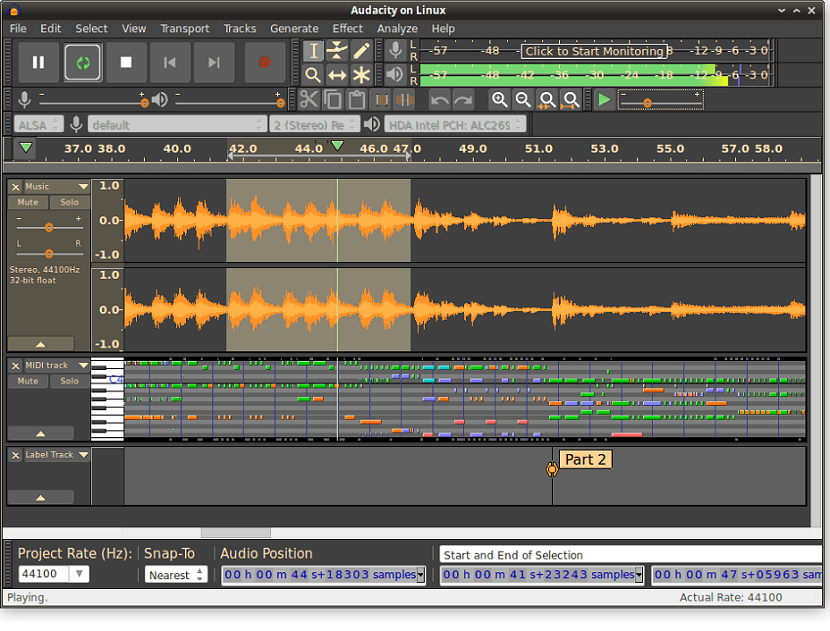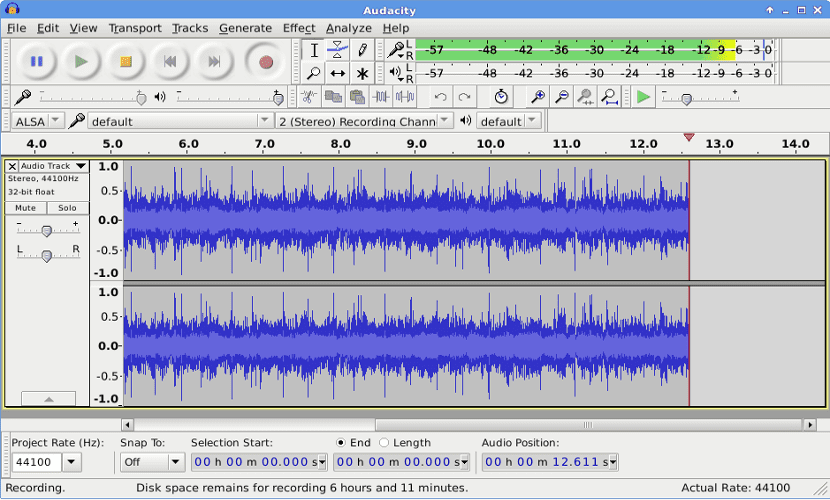
Audacity is one of the most emblematic programs of Free Software, with which we can record and edit audio digitally from our computer. This application is cross-platform so it can be used on Windows, MacOS, Linux, and more.
Audacity in addition to allowing us to record multiple audio sources as well can allow us to post-process all types of audio, including podcasts, by adding effects such as normalization, clipping, and fading in and out.
Among the features of Audacity include:
- Audio recording in real time.
- Editing Ogg Vorbis, MP3, WAV, AIFF, AU, LOF and WMP audio files.
- Conversion between audio type formats.
- Import of MIDI, RAW and MP3 format files.
- Multi-track editing.
- Add effects to the sound (echo, inversion, tone, etc).
- Possibility of using plug-ins to increase its functionality.
With Audacity, live audio recordings can be made through the microphone or a mixer, convert tapes and recordings to digital recording or CD, support for sound editing (WAV, AIFF, FLAC, MP2, MP3 or Ogg Vorbis), change the speed or timbre of a recording, cut, copy, paste or mix sounds.
The program it also has the ability to capture streaming audio, manage multiple input and output devices. Level meters can monitor volume levels before, during and after recording.
How to install Audacity on Ubuntu 18.10 and derivatives?
Due to the great popularity of Audacity, this We can find it within the Ubuntu repositories as well as many of the Linux distributions.
In order to install this tool we have three methods from which you can choose the one you like the most.
The first and easiest installation method is by directly installing Audacity from our Ubuntu software center. or with the help of Synaptic, additionally for those who prefer it They can install from a terminal with the following command:
sudo apt install audacity
Install Audacity from repository
The second method that we have to obtain this excellent utility in our system is with the help of an application repository.
Although Audacity is already within the Ubuntu repositories, there is an Audacity repository which provides the most recent versions of it.
With this we do not mean that the Audacity package within the Ubuntu repositories is out of date, simply that in the repository of this when they launch a new version you can have it immediately.
While in Ubuntu repositories, applications are not usually updated immediately.

To add this repository we must open a terminal Ctrl + Alt + T and in it we are going to execute the following commands:
sudo add-apt-repository ppa:ubuntuhandbook1/audacity
We update the list of packages and repositories with:
sudo apt-get update
Finally we proceed to install the application with:
sudo apt-get install audacity
Install Audacity from Flatpak
The last method with which we can install this audio player in our beloved Ubuntu or one of its derivatives is with the help of Flatpak packages.
For this We must have Flatpak support to be able to install by this method.
Once you are sure you have Flatpak support, just type the following command in a terminal:
flatpak install --from https://flathub.org/repo/appstream/org.audacityteam.Audacity.flatpakref
Additionally, if you are using Ubuntu and not a derivative, that is, you have Gnome Shell as a desktop environment, you can directly install the application from the software center of this-
Finally, you can open this audio player on your system by searching for its launcher in your application menu.
In case of not finding the launcher, you can run the application with the following command:
flatpak run org.audacityteam.Audacity
If you already had the player installed by this means and you want to check if there is an update to it, you can do it by typing the following command in a terminal:
flatpak --user update org.audacityteam.Audacity
Thank you, your information was very useful, I was able to install it on my notebook with real lubuntu, thank you very much